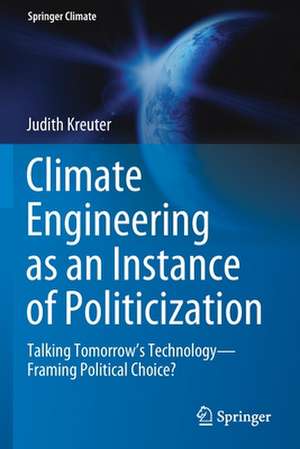Climate Engineering as an Instance of Politicization: Talking Tomorrow’s Technology—Framing Political Choice?: Springer Climate
Autor Judith Kreuteren Limba Engleză Paperback – 3 dec 2021
| Toate formatele și edițiile | Preț | Express |
|---|---|---|
| Paperback (1) | 639.90 lei 6-8 săpt. | |
| Springer International Publishing – 3 dec 2021 | 639.90 lei 6-8 săpt. | |
| Hardback (1) | 646.11 lei 6-8 săpt. | |
| Springer International Publishing – 2 dec 2020 | 646.11 lei 6-8 săpt. |
Din seria Springer Climate
- 18%
 Preț: 1014.45 lei
Preț: 1014.45 lei - 15%
 Preț: 644.95 lei
Preț: 644.95 lei - 20%
 Preț: 753.10 lei
Preț: 753.10 lei - 18%
 Preț: 730.79 lei
Preț: 730.79 lei - 20%
 Preț: 505.38 lei
Preț: 505.38 lei - 17%
 Preț: 362.53 lei
Preț: 362.53 lei - 15%
 Preț: 646.62 lei
Preț: 646.62 lei - 18%
 Preț: 910.26 lei
Preț: 910.26 lei - 18%
 Preț: 1009.70 lei
Preț: 1009.70 lei - 18%
 Preț: 781.94 lei
Preț: 781.94 lei - 18%
 Preț: 1128.57 lei
Preț: 1128.57 lei - 18%
 Preț: 960.13 lei
Preț: 960.13 lei - 20%
 Preț: 513.20 lei
Preț: 513.20 lei - 18%
 Preț: 894.79 lei
Preț: 894.79 lei - 15%
 Preț: 596.87 lei
Preț: 596.87 lei - 15%
 Preț: 645.28 lei
Preț: 645.28 lei - 18%
 Preț: 893.84 lei
Preț: 893.84 lei - 18%
 Preț: 1113.39 lei
Preț: 1113.39 lei -
 Preț: 352.80 lei
Preț: 352.80 lei - 15%
 Preț: 638.76 lei
Preț: 638.76 lei - 18%
 Preț: 1001.19 lei
Preț: 1001.19 lei - 18%
 Preț: 953.52 lei
Preț: 953.52 lei - 15%
 Preț: 642.18 lei
Preț: 642.18 lei - 15%
 Preț: 643.34 lei
Preț: 643.34 lei - 15%
 Preț: 656.25 lei
Preț: 656.25 lei -
 Preț: 416.16 lei
Preț: 416.16 lei - 15%
 Preț: 644.95 lei
Preț: 644.95 lei - 15%
 Preț: 690.11 lei
Preț: 690.11 lei - 15%
 Preț: 465.15 lei
Preț: 465.15 lei -
 Preț: 357.43 lei
Preț: 357.43 lei - 18%
 Preț: 1121.13 lei
Preț: 1121.13 lei - 18%
 Preț: 1114.34 lei
Preț: 1114.34 lei - 15%
 Preț: 696.82 lei
Preț: 696.82 lei - 18%
 Preț: 958.38 lei
Preț: 958.38 lei - 15%
 Preț: 697.15 lei
Preț: 697.15 lei
Preț: 639.90 lei
Preț vechi: 752.83 lei
-15% Nou
Puncte Express: 960
Preț estimativ în valută:
122.44€ • 127.84$ • 101.34£
122.44€ • 127.84$ • 101.34£
Carte tipărită la comandă
Livrare economică 05-19 aprilie
Preluare comenzi: 021 569.72.76
Specificații
ISBN-13: 9783030603427
ISBN-10: 3030603423
Ilustrații: XX, 264 p. 38 illus., 37 illus. in color.
Dimensiuni: 155 x 235 mm
Greutate: 0.4 kg
Ediția:1st ed. 2021
Editura: Springer International Publishing
Colecția Springer
Seria Springer Climate
Locul publicării:Cham, Switzerland
ISBN-10: 3030603423
Ilustrații: XX, 264 p. 38 illus., 37 illus. in color.
Dimensiuni: 155 x 235 mm
Greutate: 0.4 kg
Ediția:1st ed. 2021
Editura: Springer International Publishing
Colecția Springer
Seria Springer Climate
Locul publicării:Cham, Switzerland
Cuprins
Talking tomorrow’s technology, framing political choice?.- An idea – and more than an idea: Climate Engineering in research and decision-making.- deas and objects, meaning and causation – Frame analysis from a modernist social constructivism perspective.- The early discussion of nuclear weapons technology in the 1930s and 1940s – Illustrating the theoretical construct.- The Tools for empirical analysis – The method of qualitative content analysis.- The academic framing of Climate Engineering – A diverse field presenting interesting landmarks.-Climate Engineering as an instance of politicization – A diversity of frames in the academic discussion.- Literature.
Notă biografică
Judith Kreuter is interested in the interrelation of societal, political and technological aspects of change processes. Nuclear energy technology, the transition to renewable energy technologies and processes of digitalization are foci of her research and teaching activities. She studied political science, philosophy and international relations at the Universities of Heidelberg, Frankfurt/Main and Darmstadt (Germany) as well as the Institut des Sciences Politiques in Lille (France). During her research, she visited the Universities of Harvard, Oxford, Klagenfurt and Munich, among others.
Textul de pe ultima copertă
This book examines the academic discussion on climate engineering as an instance of politicization – as a subject of deliberation and decision-making. It traces legitimizing and delegitimizing frames applied to discuss both Carbon Dioxide Removal and Solar Radiation Management approaches in academic publications, and their implications for political decision-making. Moreover, it offers insights into how academic discourse on climate technology can influence political decision-making – especially at a technological stage where a socio-technical system with a high degree of inertia does not (yet) exist. The high degree of diversity of frames in the academic discussion is understood as an opportunity for deliberate decision-making concerning the future roles of these approaches in global climate policy. This book demonstrates how insights from science and technology studies can be operationalized in empirical political analysis. It appeals to scholars in both political science and environmental science who are interested in climate change policy-making and the science–policy nexus.
Caracteristici
Examines the implications of academic framing for political decision-making Provides an account of how to operationalize insights from Science and Technology Studies in empirical political analysis Covers both Solar Radiation Management and Carbon Dioxide Removal/Negative Emissions Technologies
